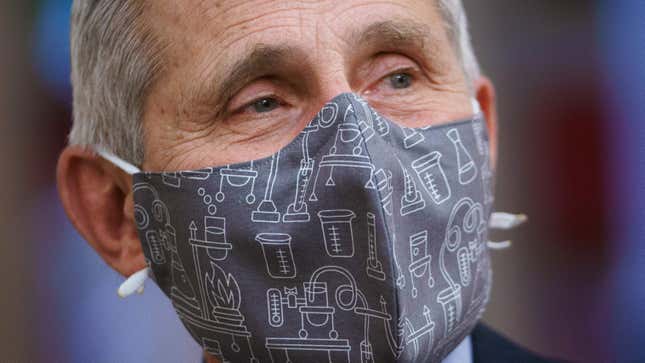
On Wednesday, Anthony Fauci trotted out to the White House briefing room podium, prompting a stream of memes to rival Bernie at inauguration. We had a how it started/how it’s going Fauci comparison under Trump and Biden. We had Fauci walking in slow motion set to the “Welcome Back, Kotter” theme song. And there was a general horniness-on-main vibe at seeing an actual expert trotted out to talk candidly.
That response is totally understandable. After all, a core part of President Joe Biden’s electoral pitch was that he’s a guy who trusts in science. And after four years of an administration that gave science the finger and muzzled researchers that didn’t toe the party line, it’s great! We should definitely be listening to the scientists and allow them to communicate honestly with the public.
While I am decidedly and extremely pro-science informing policy as opposed to basing it on whatever melted sherbet fell out of Donald Trump’s ear, we also can’t fetishize science over people’s lived experiences. Instead, science needs to be seen for what it is: just one part of policymaking. That’s true whether it’s covid-19 or the climate crisis.
With covid-19, science has undoubtedly led to some remarkable developments. It has given us proof that masks and social distancing work, but it says nothing about how to convince Republicans doing so isn’t an infringement on their civil liberties. It’s led to the rapid creation and deployment of two vaccines in the U.S., but it hasn’t told us how to equitably deploy them or build trust in the communities where there’s resistance.
Black communities have been particularly hard-hit by the virus, with Black Americans dying at twice the rate compared to white Americans. Yet trust in the vaccine remains low in some Black communities, in part because of the historical ways science has been used to experiment on Black Americans rather than to their benefit. The Tuskegee study was a wildly racist and unethical experiment that’s only the egregious example of science deployed against a segment of society. While it’s hardly the only reason some in the Black community distrust the vaccine, it shows the dangers of science without ethics and how the impacts can reverberate for decades.
Writing in the New England Journal of Medicine this week, two Harvard researchers also pointed out that the present-day racial discrepancies in our healthcare system—one supposedly predicated solely on the best available science—are also key factors in low levels of trust in the Black community. It points to the fact that simply telling folks to “trust the science” and get vaccinated isn’t an effective strategy on its own, assuming those services are even being made available. (There are signs they’re not in some places).
“Framing the conversation about distrust in Covid vaccines in terms of everyday racism rather than historical atrocities may increase underserved communities’ willingness to be vaccinated,” the authors wrote, also noting that having more Black leaders out in front is a key way to further increase trust.
In the case of the climate crisis, the science tells us we need to cut emissions as fast as possible. But without a plan or real engagement with the communities most impacted, relying solely on science could be a disaster. A prime example are France’s yellow vest protests a few years ago. There, French President Emmanuel Macron instituted a gas tax as a means to curb consumption and, thus, emissions. The problem was it screwed people in rural areas without transit access, leading to widespread protests and an eventual retreat on the tax.
The U.S. faces a similar risk if Biden plows forward to rapidly reduce emissions or adapt to the impacts of climate change without engaging with communities and listening to their needs. Take sea walls, which are great at keeping storm surge at bay: Protection in one place can make storm surge worse elsewhere. Bespoke climate solutions like folding shields may be nice if you’re behind them when a hurricane hits, but if you’re in a neighborhood the excess water runs into, they’re a disaster.
This goes well beyond the theoretical. Indigenous communities have made clear their treaty rights should be a driver in the discussion of ending fossil fuel extraction while fenceline communities are asking for cleaner air to breathe and a shot at a liveable wage. Oil and gas workers will need a transition out of their industry as well, and science doesn’t say how to address any of that. Biden has pledged to ensure environmental justice communities receive 40% of funding from his infrastructure plan, and he needs to be held to that standard, not just singing the praises of science.
So ‘yasss Fauci’ and all that, but we can’t yasss so loudly that it drowns out what communities are saying they need, too.